Course Accessibility Express Grants Remove Barriers to Student Success

DELTA’s Accessibility Team is fast acquiring a reputation for exceptional leadership in fostering a culture of inclusion at NC State. Established in 2021, this interdisciplinary team works toward a strategic shared vision of educational equity for all students, regardless of ability or identity, through accessible digital practices.
“Our team aims to be proactive about accessibility instead of being reactive when issues arise,” explained DELTA Lead Instructional Designer Caitlin McKeown, an award-winning accessibility team member.
As well as supporting NC State instructors in implementing accessibility tools and practices in online learning environments, the DELTA Accessibility Team was instrumental in creating the new DELTA Course Accessibility Express Grants.
First offered in fall of 2023, these semester-long initiatives pair DELTA experts with NC State instructors to identify research-based strategies for removing or decreasing barriers to equitable course access. The grants focus on both big picture issues, like accessibility and usability of course spaces in the learning management system Moodle, and specific technological challenges, such as converting documents to formats compatible with screen readers.
“Our goals with this grant are to educate instructors, to build our own skills and knowledge, to develop more shareable resources and to incentivize proactive accessibility work by NC State instructors,” explained Jonathan Champ, DELTA’s Associate Director for Data, Integrations and Custom Applications.
The accessibility team recently shared their findings and transferable lessons after wrapping up their first year of Course Accessibility Express Grant projects.
Ensuring Accessibility in Online Learning
During the 2023-2024 academic year, the DELTA Accessibility Team partnered with six NC State faculty recipients of the inaugural Course Accessibility Express Grants, three in fall semester 2023 and three in spring semester 2024:
- Alina Duca, MA 225: Foundations of Advanced Mathematics, Department of Mathematics
- Remi Ham, HS 205: Home Food Production, Department of Horticultural Science
- Julia McKeown, ECI 514: Developing and Delivering Online Instruction, Department of Teacher Education and Learning Sciences
- Shawn Cradit, HESM 478: Exercise Physiology and Sports Science, Division of Academic and Student Affairs
- Luke Castle, MA 421: Intro to Probability, Department of Mathematics
- Faye Simon, MA 405: Intro to Linear Algebra, Department of Mathematics
Coming to the grant process with varying levels of accessibility awareness, course preparation, and instructional challenges, all six instructors had a shared goal of addressing barriers to equitable access in their courses to better meet the needs of their students.
Supporting Low Vision Students
Professors Duca, Castle and Simon all wanted to address visual accessibility barriers in their math courses. They each wanted to audit the accessibility of their content while considering strategies that could be used by students with low vision or blindness to express their learning and comprehension in an accessible way.
Working with the math faculty posed some unique and challenging questions for the DELTA team about how best to meet the needs of students and instructors. “Looking at math from the perspective of addressing a visual impairment really pushed the solutions to a unique space,” explained DELTA Team Lead for Multimedia Development David Tredwell.
Duca, for example, shared her strategy of recording herself reading math proofs aloud and sharing the recordings via Moodle. This technique proved extremely useful to any visually-impaired students — and popular with the entire class.
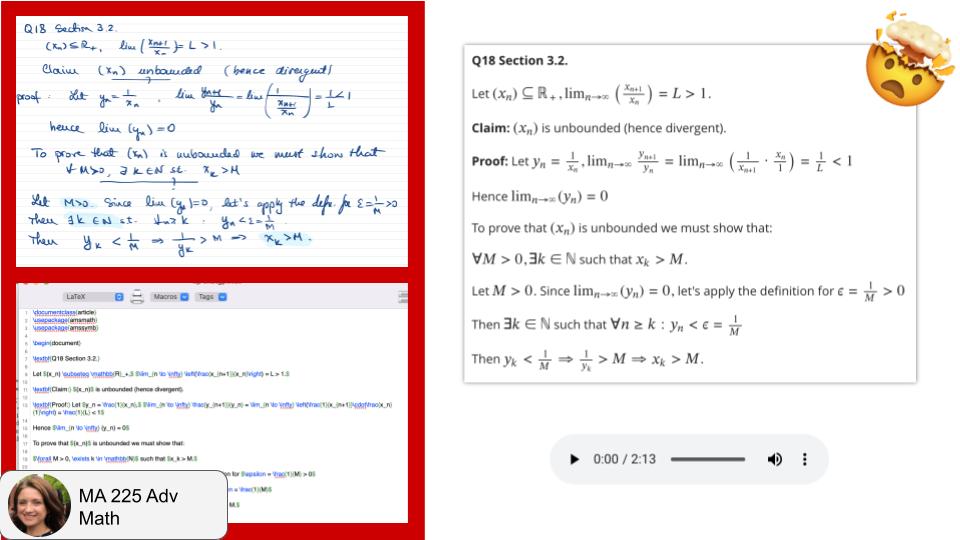
Having a shared goal allowed the math instructors to collaborate on solutions as a team. They were able to share their insights with each other with added guidance from their DELTA specialists to support their students.
“I feel much more comfortable now providing accommodations for future low vision students,” said Simon, “and I plan to use these strategies in my courses whether I am providing official accommodations or not.”
Remediating Course Content for Accessibility
For Julia McKeown’s graduate education class in fall 2023, the grant project focused on converting existing PDFs of course content to accessible and aesthetically-pleasing Moodle templates that McKeown could use in future courses. Rather than creating custom HTML for each converted document, the team leaned on the front-end framework Bootstrap, included in Moodle, which provides the underlying visual framework for various features like accordion tables and callouts.
“We anticipate these visual elements created with Bootstrap will be updated alongside the annual Moodle upgrades,” said Tredwell, “so that this approach can be applied to other courses.”
Similarly, for Remi Ham’s home food production class, the accessibility team developed a workflow to improve the accessibility of online lecture material. Ham’s original PowerPoint slides were compressed and converted to PDFs in a way that preserved their remediation. After following this process, each PDF passed the accessibility checker at 100%.
Finally, for Shawn Cradit’s exercise physiology course, the DELTA team conducted a thorough audit of video capture and sharing. Her current process was not adequately capturing all aspects of the lecture for those watching the recording. For instance, the video didn’t fully demonstrate body movements intended to demonstrate physiological movement like pronation of the ankle.
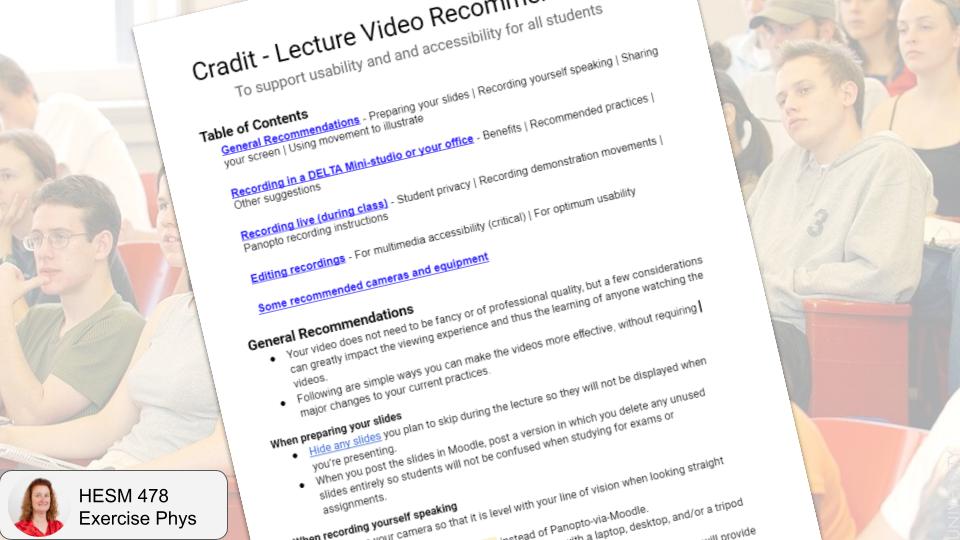
The DELTA team provided helpful recommendations to Cradit such as tips on preparing slides, recording yourself speaking, sharing your screen and effectively using movement to illustrate ideas.
The team also offers best practices for editing recordings with an accessibility lens and optimum usability, and the pros and cons of recording in a studio or office compared to in a live classroom setting. These recommendations will be incorporated into DELTA’s existing, publicly available guidance.
Employing ChatGPT Functionality
With several of the grant projects, the DELTA team found exciting applications for ChatGPT. For example, in Duca’s math course, ChatGPT was used to translate handwritten math proofs using LaTeX, the gold standard for accessible formatting, which then gets interpreted in Moodle using MathJax.
This proved a learning opportunity for the DELTA team. “The process of translating from written notation to LaTeX to MathJax wasn’t always seamless,” said Tredwell. “Luckily, the instructor, Alina Duca, really took the reins on these translations and shared with us her findings for speeding up the process.”
Ham’s home food production course materials use many images of produce, which are an essential component of the course. ChatGPT was used as a starting point to describe the appearance of various fruits and vegetables for use in a Moodle course glossary and further refined for image alternative text (alt text).
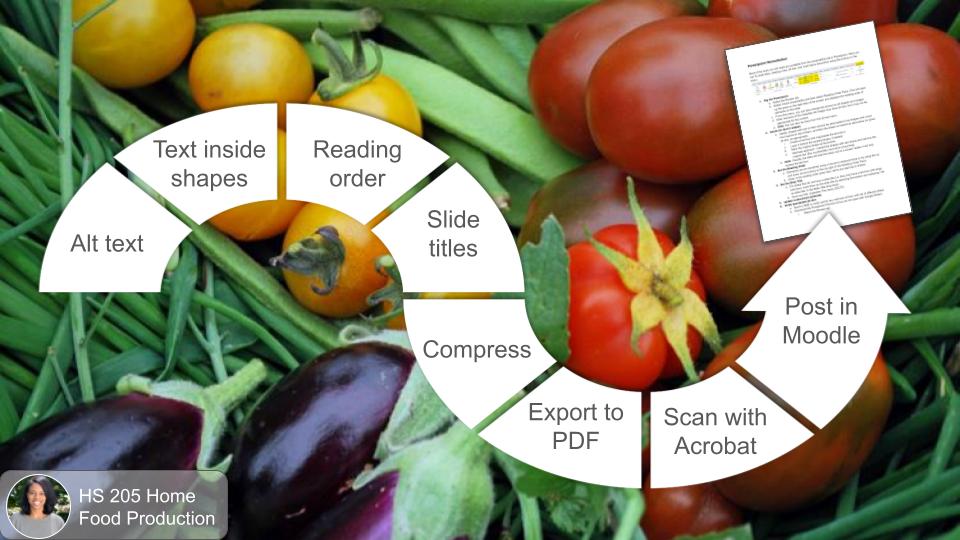
Similarly, in Cradit’s exercise physiology course, ChatGPT was useful when describing different anatomy structures and physiology concepts. The enhanced descriptive alt text generated by ChatGPT proved to be particularly useful in both courses when creating quizzes. For example, when a student using a screen reader is tasked with identifying a particular plant disease or exercise movement, the alt text description can be created to provide the needed additional information to answer the question without divulging the quiz answer.
Exploring Tactile Graphics
For DELTA staff and instructors alike, a highlight of the accessibility grants experience was a visit during the fall semester to the NC State Libraries Makerspace Program at D.H. Hill Jr. Library. There they discovered the many ways the Makerspace can augment course accessibility initiatives, such as tactile graphics for vision-impaired learners.
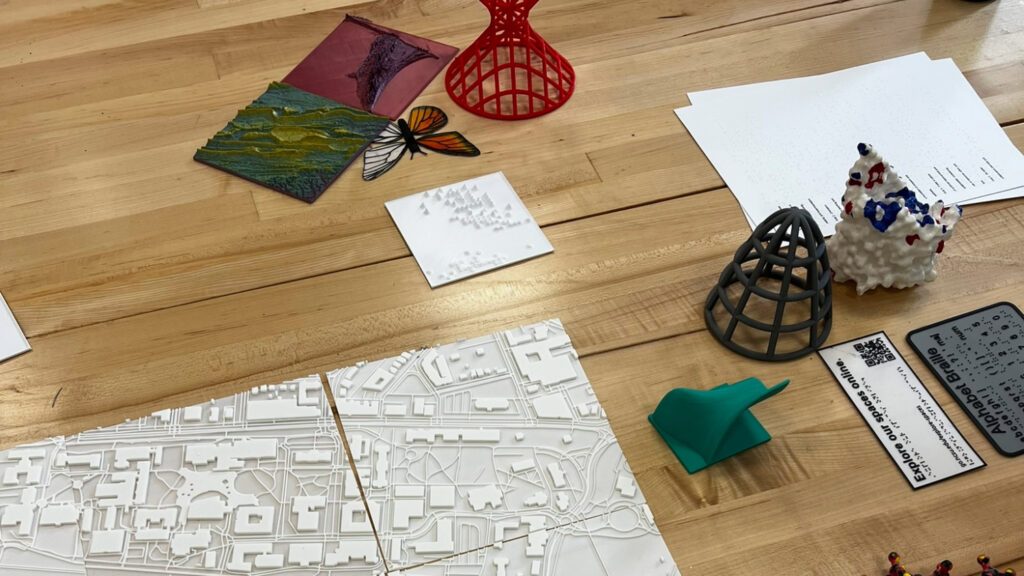
In Luke Castle’s probability course, the DELTA team wanted to create 3D manipulatives from 2D visual concepts. The goal was to assist Castle with creating his own models, but the DELTA team first needed to understand the process themselves.
The DELTA team created a set of models for Castle’s class that included source files and access to the equipment needed to create additional tactile graphics in the future. This was accomplished by using the Makerspace 3D printers, which are available to NC State faculty, staff and students for free after an orientation session.
“This was such a fun and informative event, but the best part was how we brought together faculty and staff from all these different departments across campus,” said Jill Anderson, DELTA Lead Instructional Technologist and accessibility team member.
Broad Applications for DELTA Accessibility Resources
For the DELTA Accessibility Team, one of the key goals for the inaugural year of accessibility grants was to create scalable remediation templates and processes for use by instructors across the university. Many of these resources are collected in DELTA’s Digital Accessibility Guide, an essential tool for instructors wanting to improve their online course accessibility.
The guide also gives information on available accessibility checkers for Microsoft, Google and Moodle. It can be used in combination with DELTA’s Online Course Usability and Accessibility Checklist to audit any digital materials.
Looking to the fall, DELTA is joining forces with the Libraries and the Office of Information Technology to form the new NC State Accessibility Collaborative (NCStAC). Any NC State instructors, staff and students interested in learning more are encouraged to fill out the interest form.
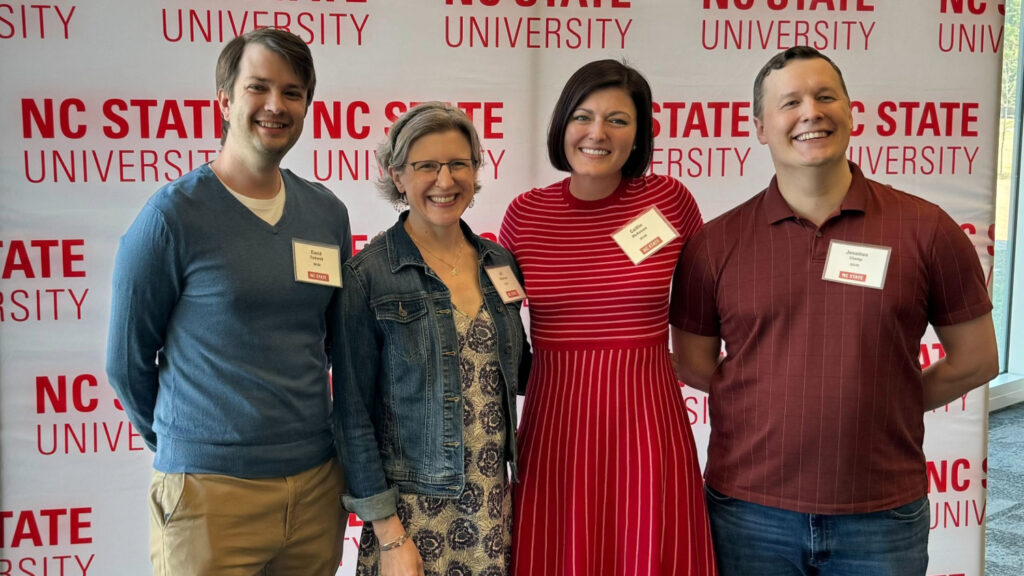
The 2023-2024 DELTA Course Accessibility Express Grants were supported by the DELTA Digital Learning Accessibility Team. Reach out to them with any questions about the grants:
- Jill Anderson, Lead Instructional Technologist, Digital Learning
- Jonathan Champ, Associate Director, Data, Integrations and Custom Applications, Academic Technology
- Caitlin McKeown, Lead Instructional Designer, Digital Learning
- David Tredwell, Team Lead, Multimedia Development, Digital Learning
Ready to Apply?
DELTA Express Grants enhance the digital learning environment at NC State by leveraging the latest technologies, applying research-based standards of excellence and exploring advancements in instructional design.
Instructors are invited to apply for a fall 2024 DELTA Course Accessibility Express Grant between August 19 – September 6, 2024.
- Learn more about DELTA Course Accessibility Grants
- View our DELTA Express Grants FAQ page for information about grant eligibility, the review process and general inquiries.
- Email deltaexpressgrants@ncsu.edu with specific questions.


